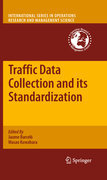
This book contains twelve selected papers presented at the International Workshop on Traffic Data Collection and its Standardization held on September 8-9th 2008 in Barcelona. Organized and chaired by Barcelo and Kuwahara, the workshop was intended to examine the purposes and quality of data and how it is collected and used in traffic analysis, with the overall intent of improving and standardizing the practice. Traffic data is the cornerstone to everything from the most classical traffic control analysis to the most advanced real-time control and management implementing modern Intelligent Transportation Systems (ITS) applications. These applications are primarily based on the availability oftraffic data supplied by a Data Collection System which, equipped with more or less sophisticated technologies, provides measurements on the fundamental traffic variables, ideally with the required level of temporal aggregation, and perhaps, when the technology allows it, additional measurements on other variables of interest, depending on the type of application in which they will be used. The applications are in turn supported by models, and in fact the primaryuse of the data is to provide the input to traffic models whose quality depends on the quality, consistency, robustness, completion and other characteristics of the data. Presents the state of the art in traffic data collection and standardization Brings the field completely up to date As ITS are increasingly being developed around the world, the information in this book is critically needed INDICE: "Traffic Data Collection & its Standardization.- Data Collection, Use and Provision at the Transport Data Centre, New South Wales, Australia.- Data Collection for Measuring Performance of Integrated Transportation Systems.- International Traffic Database - Gathering Traffic Data Fast and Intuitive.- Data Mining For Traffic Flow Analysis: Visualisation Approach.- The Influence of Spatial Factors on the Commuting Trip Distribution in the Netherlands.- Dynamic Origin-Destination Matrix Estimation Using Probe Vehicle Data as A-Priori Information.- Using Probe Vehicle Data for Traffic State Estimation in Signalized Urban Networks.- Floating Car Data Based Analysis of Urban Travel Times for the Provision of Traffic Quality.- A Cost-Effective Method for the Detection of Queue Lengths at Traffic Lights.- Extended Floating Car Data in Cooperative Traffic Management.- Microscopic Data for Analyzing Driving Behavior at Traffic Signals.
- ISBN: 978-1-4419-6069-6
- Editorial: Springer
- Encuadernacion: Cartoné
- Páginas: 243
- Fecha Publicación: 01/05/2010
- Nº Volúmenes: 1
- Idioma: Inglés
